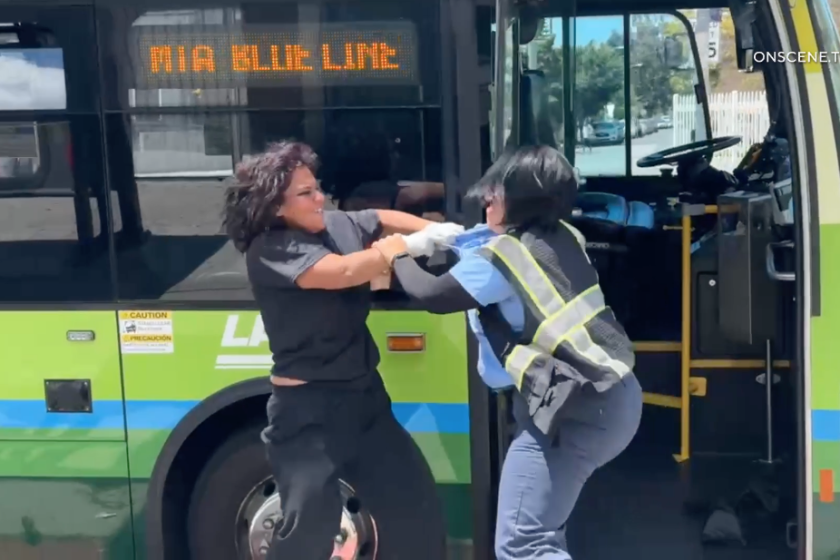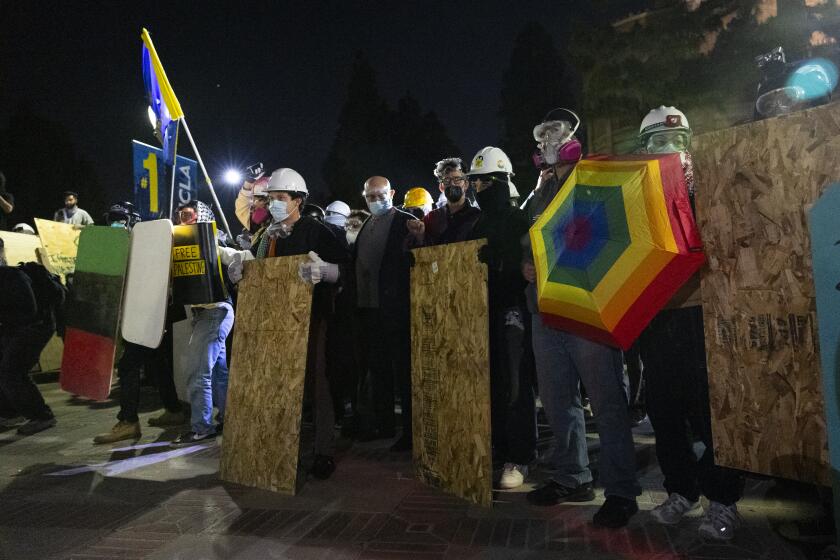Another Drug Case Dropped in Deputy Scandal
The Los Angeles County district attorney’s office suffered a major setback Tuesday when a judge threw out charges against four accused drug traffickers, further damaging attempts by prosecutors to salvage cases involving suspended sheriff’s deputies.
The case was the latest in a series of prosecutions dismissed because they relied on testimony of narcotics officers under investigation in a deepening money-skimming scandal.
Prosecutors, however, said this was the first time a case has been permanently dismissed, even though officers untouched by the scandal were available to testify. It appeared to undercut their strategy to save other cases involving suspended deputies.
“I would like to have seen at least one case where we would have been able to proceed without these officers testifying,” said Robert Schirn, head of the district attorney’s major narcotics division.
Seven other cases have been dismissed or withdrawn since the scandal broke Sept. 1 because some of the 18 suspended sheriff’s officers were the only key witnesses.
Schirn said Tuesday’s ruling does not mean that all other cases involving tainted witnesses are lost.
“We’ll argue them on a case-by-case basis,” he said. “Each case has to stand or fall on its own facts.”
Despite pleas from prosecutors, Municipal Judge Lois Anderson-Smaltz dismissed the charges against the four defendants, who were accused of selling cocaine to an undercover officer and attempting to murder several officers participating in the May “sting” operation.
The same case had been dismissed two weeks ago by a different Municipal Court judge, but prosecutors immediately refiled it because they thought the judge had misinterpreted the law.
Schirn said Tuesday’s case, and up to 10 other major prosecutions, differs from the cases dismissed earlier because law enforcement officers not under investigation can testify to the facts of the arrests and searches.
The suspended deputies are the focus of a yearlong federal and local inquiry into allegations that hundreds of thousands of dollars has been stolen during raids.
As part of their evolving strategy, prosecutors Tuesday called on an untainted sheriff’s lieutenant and two Brea police officers to testify.
But Anderson-Smaltz said she was required to follow sanctions imposed by Municipal Judge David S. Milton on Monday after the Sheriff’s Department refused to turn over investigative documents about the six suspended deputies involved in the case.
Milton had ordered the case dismissed if any of the suspended officers involved refused to answer all questions posed by defense attorneys. Three refused to testify Tuesday.
The outcome of the case remained in doubt as it was shuttled through three other courtrooms Tuesday for a preliminary hearing. One judge bowed out, saying his calendar was too crowded, while another, Municipal Judge David Horwitz, said he found Milton’s sanctions to be “bizarre” and would not enforce them. Finally, Anderson-Smaltz did.
“It’s very unfortunate that a case gets passed from judge to judge like this,” the frustrated judge said. “I’m not going to go back and rehear the whole thing.”
The ruling freed David Estrada, Daniel Fendley, Rafael Llamas and Richard Morales, who had been arrested last May and accused of selling five kilograms of cocaine to an undercover officer in Carson. They were also charged with attempted murder and assault because they allegedly shot at officers and tried to run over them with a car.
Prosecutor Schirn was critical of the convoluted process that led to the dismissal.
He said that in the end, Anderson-Smaltz was “blindly following (another judge’s) ruling without knowing the evidence involved.”
Defense attorneys said that they were also bothered by the courtroom juggling but said that Anderson-Smaltz had no choice but to dismiss the case because a fair trial was impossible if the suspended deputies would not answer questions about their investigation.
Debra Smith, who represents the 27-year-old Estrada, claimed her client was entrapped by the narcotics officers. She said the investigative team was headed by suspended Deputy James R. Bauder and that search warrants were based on information he gained from an informant.
“Especially with an entrapment defense, you can’t have a (fair trial) if they won’t testify,” she said.
Sgt. Robert R. Sobel and suspended deputies Terrell H. Amers, Eufrasio G. Cortez, Ronald E. Daub and John C. Dickenson were also among the officers participating in the May drug bust. Cortez, Daub and Dickenson all refused to testify, claiming their 5th Amendment right against self-incrimination.
Under Milton’s ruling, the entire case was to be dismissed if a single suspended deputy refused to testify.
The two Brea police officers who participated in the drug case--including the undercover officer who allegedly bought cocaine from one of the suspects--were in court waiting to testify. So was a Sheriff’s Department narcotics supervisor who witnessed the seizure of the cocaine.
Deputy Bauder, who sat through two days of hearings, said he was frustrated by the dismissal of so many cases that he had worked on.
“This is terrible, just terrible,” Bauder said. “I am more than willing to testify on the facts of each of these cases. This is so frustrating.”
But Milton barred prosecutors from calling any of the deputies as witnesses. Defense attorneys, who were allowed to call the suspended deputies, did not put Bauder on the stand because they knew he was willing to testify.
Schirn said he was not sure whether he would appeal the decisions of Milton and Anderson-Smaltz.
“I think it’s very clear that we should be allowed to go forward,” the prosecutor said. “There are no allegations that there were narcotics planted or other allegations that go to the structure of the case. I think that’s a very powerful reason we should be able to proceed with the untainted deputies and police officers.”
More to Read
Start your day right
Sign up for Essential California for news, features and recommendations from the L.A. Times and beyond in your inbox six days a week.
You may occasionally receive promotional content from the Los Angeles Times.






